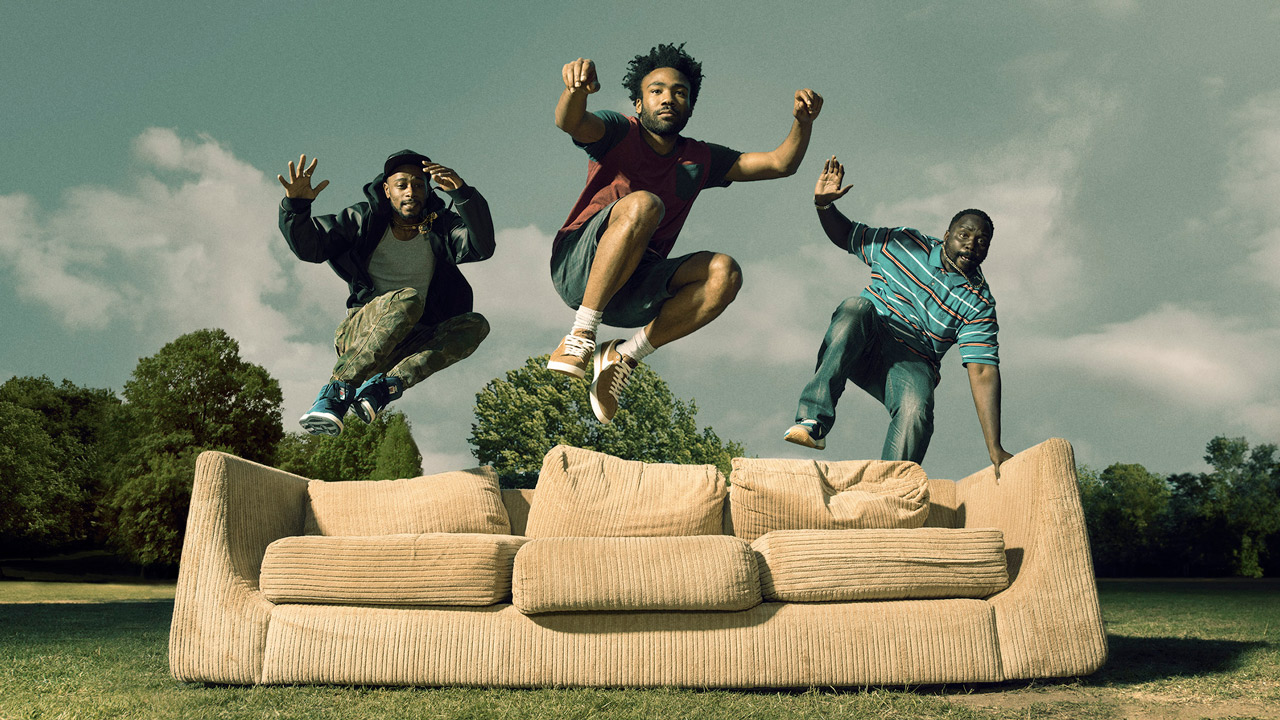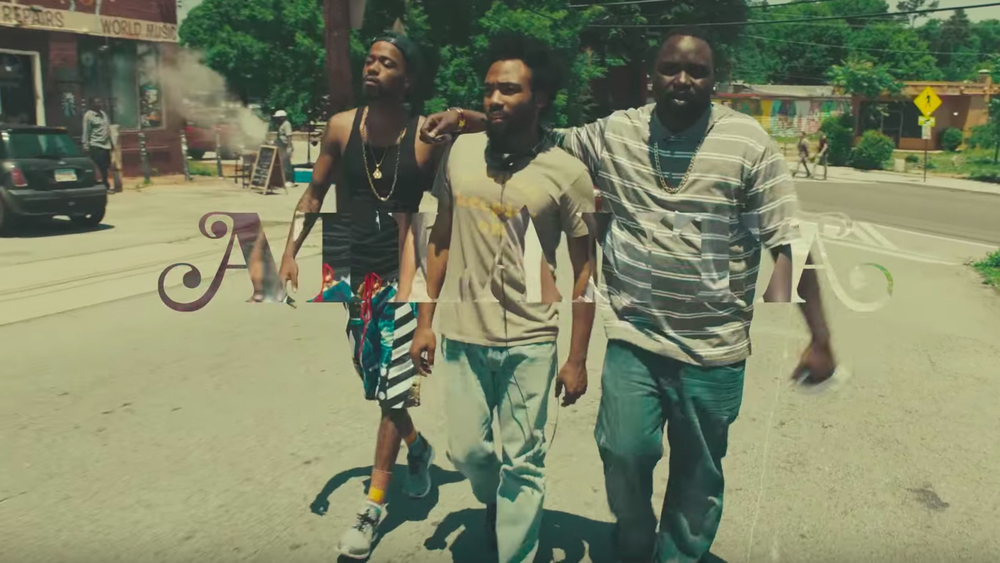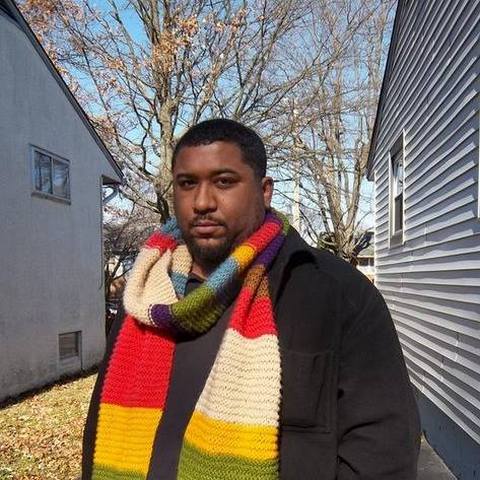Atlanta and Queen Sugar: Two More Americas To Consider

Written by Scott Woods
Photo via FXnetworks
This past week was a glorious time, sitting in anticipation of not one but two critically-lauded out the gate TV shows starring almost exclusively black casts that don’t look like trash. It was downright odd to be surrounded by the marketing for them, with their flickering promises of hip, beautiful black people doing…whatever it is Atlanta was selling, anyway. I had a better grip on Queen Sugar’s narrative since it’s based on a novel, but Atlanta was coy. Having watched the first two episodes of both shows now, I’m both pleased and perplexed. It’s mostly Atlanta’s fault, but I want to start with Queen Sugar because that’s the easy one.
Queen Sugar is a typical family drama executed in wonderfully untypical cinematic fashion for a television show STARRING BLACK PEOPLE. A lot of Queen Sugar is good for a show STARRING BLACK PEOPLE. I welcome it’s well-acted, well-cast, finely directed offering of what is ultimately predictable fare.
Queen Sugar isn’t going to win any Emmys (it might get nominated for a couple), but it brings to the table an Oscar-worthy co-creator in Ava DuVernay, who in my mind can do no wrong right now. She’s also not content with just collecting Oprah bread: she’s hired all-women directors for the whole season, thrown Meshell Ndegeocello on the music, and is generally crafting a show that visually and rhythmically rivals anything that’s hit the small screen. The changes she made to the novel bring the story more firmly into familiar TV drama territory (perhaps to its detriment; we’ll see), but she’s setting up some interesting angles that will probably pay off in ways other shows on TV won’t, mostly because they’re told by, about and for black people. It’s a solid show overall, and for a black show it is head and shoulders in quality over all its other competition.
…depending on how you feel about Atlanta.

Promotional Still from FX’s Atlanta, Starring Donald Glover (Center) and Brian Tyree Henry (Right)
I’ve tried not to drag in any baggage about Donald Glover to Atlanta, mostly because what I’ve accessed about him past Community I found lacking. His music is okay, his stand-up is boring, and his interviews are generally a mash of ideas I hope he was drunk when pronouncing. Glover can act and clearly has a couple of axes to grind, so I held out hope for something impressive in Atlanta, trying hard to stay away from anything that might reveal what the commercials did not reveal. Well, two episodes in and I’m still wondering. And not in that, “Oh, this is Seinfeld” kind of way. More in that “This better start making sense quick or else” kind of way. I’m okay with not knowing for now, and I trust that whatever questions I might have will be answered, but I’m not sure I’m going to like all of the answers.
Let’s get something straight: Atlanta is a good show. It’s well-executed, has a great cast, and is strongly written. There are scenes in it that I loved (the Pulp Fiction-inspired golden wings box scene leaps to mind). But overall it’s politically tapped out, which in 2016 seems egregious. It’s not interested in having a conversation about issues, which isn’t a crime for a TV show, but the way it introduces issues and then moves on is more about finding the humor that can be wrung out of the awkwardness of the exchange of ideas than any attempt to actually unpack them well. Which is kind of Glover’s MO, so I’m not surprised, but I’m a little sad that he’s taking that tack here. It’s a stand-up’s tack, but Atlanta isn’t even a proper sitcom. It has long swathes (for a TV comedy) where it’s not trying to be funny at all, which gives it depth, but then it pulls its punches in a “I was just playing” way.
Take the jail scene with the mentally ill prisoner. A large amount of time is spent making a straight-up joke of the mentally ill prisoner. Glover’s meager one-liner about him actually needing help isn’t offsetting all of the comic relief pressed upon that character fully at his expense, and the resulting beatdown the character receives only serves to open up another can of worms about police brutality that also doesn’t get addressed. It’s a scene that is emotionally affecting, but not really effective. And the show has a lot of moments like that, depending on how you feel about transsexuality, the n-word, drug dealers, the state of modern hip-hop, parenthood, and a half dozen other issues that get dog-whistled onto the screen, but largely only in the interest of punchlines. Don’t get me wrong: as a testimony to how well this show is executed, I laughed at a lot of those jokes, but I bemoaned the lost opportunities as well. A lot of it ended up being a guilty pleasure for me.
Glover’s character Earn is charming if almost wholly unlikeable. I can see why no one hangs with this dude except his ex-girlfriend, and I haven’t seen a reason why she continues to do so yet. Perhaps Earn is a further extension of the multiplying variations of niggers Glover likes to traffic in for comic and shock effect in other platforms. Perhaps he’s just unpacking his issues with his blackness the only way he knows how: creatively. I’d rather he call up whoever Beyonce has been using as a politics coach over the last few years and take another crack at it. I promise, it’s not about respectability politics with me. It’s about Glover presenting what he thinks black people are like and about, knowing (and hoping) that his audience is going to be predominantly white, and offering up a show that caters to those goals. When it’s me and you hanging out at the barbershop, cool, do your thing. But there is a great deal of this that feels like an introduction to black people as Donald Glover sees them for an audience that isn’t black. This isn’t a straight to bootleg joint. This is running on FX. I know black people who didn’t even know either one of these shows was happening this week because they don’t pay for cable. Considering what we‘re offered here as examples, I’m mildly concerned on a political level. Not enough to say “don’t watch that coon trap”, but enough to say, “watch what your white friends and co-workers have to say about it.” I have a nagging fear in the back of my head that this will be the show white people see as the pinnacle of black storytelling this year. If it were a show aimed at me as its audience, or with enough winks at me to let me know that it knows someone like me is there, I’d care less. But it isn’t. This is a show designed for white audiences that happens to be extremely black. I’m sure Glover would disagree, to which I’d suggest he doesn’t have the track record to suggest I’m too far off the mark here.
I appreciate that two well-made, critically acclaimed black shows hit the air purporting to speak to the black experience and yet could hardly be more dissimilar. In fact, I love that dichotomy. I’m glad that America is getting more slices of the black pie to sample. Most of the black people I know fall between the character spectrum of these two shows politically, sexually, and intellectually, so there’s still plenty of stories left to tell. Keep America guessing, black creatives! We’ve been telling y’all for years we had other flavors. And while these flavors might be doing things with their grits that I may not like, they’re good enough that I’ll throw some shrimp in their respective bowls for now and dig in.
But I’m watching you Atlanta. I can tell that Queen Sugar isn’t going to hurt my feelings. It may not live up to my creative expectations in the long run, but it hasn’t assailed me with a single n-word or shoot-out yet, and one of its main characters sells drugs and another held-up a store. Atlanta, on the other hand, is already kind of giving the “politically attuned me” the middle finger, which is cool, but I promise you: no one is rooting for that show to strike a chord more than me, so I hope we can meet in the middle somewhere down the line.
Maybe I’m rooting too hard for black TV to rise to the political occasion. Maybe I should just sit back and enjoy whatever comes on whatever terms it sees fit to present. Maybe I’m still smarting from the political blowback of Nate Parker/Birth of a Nation. Maybe the point should be that no one gets to dictate our blackness to us, not even us. Maybe we’ve come far enough that that’s the point and now it’s every school of thought for itself. Maybe TV is a bad place to figure that out. Maybe TV is very much the front line. That’s admittedly a lot of questions for these two shows moving forward beyond “Is it funny?” or “Is it dramatic enough?”, and for all parties involved. I have my fingers crossed for some good answers because I’m not wired to simply dismiss the political implications of what two shows in such elevated positions in the zeitgeist might represent.
 Scott Woods is the author of Urban Contemporary History Month and We Over Here Now (2016 and 2013 respectively, Brick Cave Books) and has published and edited work in a variety of publications. He has been featured multiple times in national press, including multiple appearances on National Public Radio. He emcees the Writers’ Block Poetry Night, an open mic series in Columbus, Ohio. In April of 2006 he became the first poet to ever complete a 24-hour solo poetry reading, a feat he bested with seven more annual readings without repeating a single poem.
Scott Woods is the author of Urban Contemporary History Month and We Over Here Now (2016 and 2013 respectively, Brick Cave Books) and has published and edited work in a variety of publications. He has been featured multiple times in national press, including multiple appearances on National Public Radio. He emcees the Writers’ Block Poetry Night, an open mic series in Columbus, Ohio. In April of 2006 he became the first poet to ever complete a 24-hour solo poetry reading, a feat he bested with seven more annual readings without repeating a single poem.
www.scottwoodwrites.net
BROUGHT TO YOU BY



